Electoral Bonds declared "Unconstitutional" by Supreme Court: A Landmark Verdict and its Repercussions
On February 15, 2024, the Supreme Court of India delivered a unanimous verdict declaring the Electoral Bond Scheme of 2018 unconstitutional. This landmark decision, hailed by some and contested by others, has triggered significant debate and raises crucial questions about transparency, accountability, and the future of political funding in India. This article delves into the nuances of the verdict, explores its potential implications, and assesses the possible paths forward.
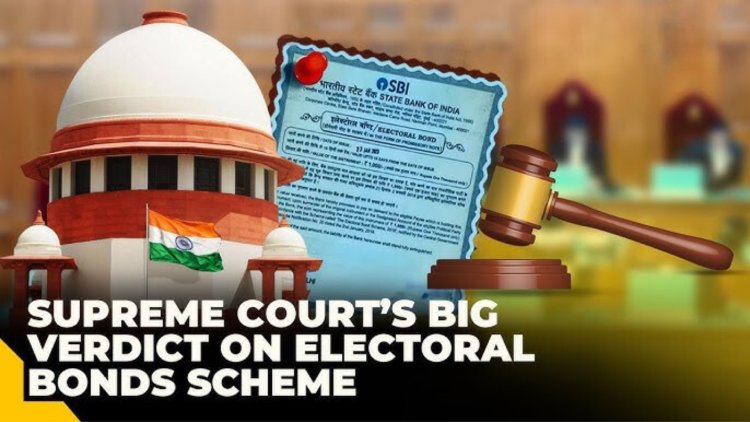
Unveiling the Scheme: Electoral Bonds - A Controversial Experiment
Introduced in 2018 by the Modi government, the Electoral Bond Scheme aimed to "cleanse the system" of political funding by offering an anonymous mechanism for donations. These bearer bonds, similar to promissory notes, could be purchased by individuals and companies from designated branches of the State Bank of India (SBI) and then redeemed by political parties within a specific timeframe. The anonymity factor was touted as a means to curb opaque donations and encourage participation from smaller donors.
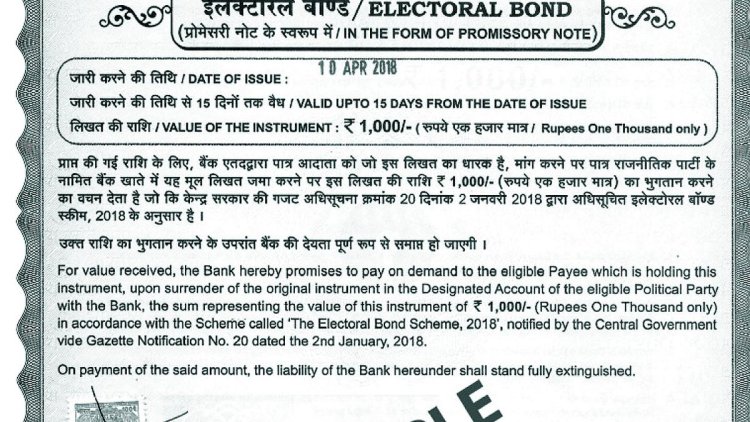
Challenges Emerge: A Flawed System under Scrutiny
However, the scheme faced criticism from its inception. Petitioners argued that the anonymity provision violated the Right to Information under Article 19(1)(a) of the Constitution, hindering transparency and accountability. Further concerns arose about potential misuse by shell companies and foreign entities, raising fears of undue influence on electoral outcomes. These concerns fueled legal challenges, culminating in the Supreme Court's verdict.
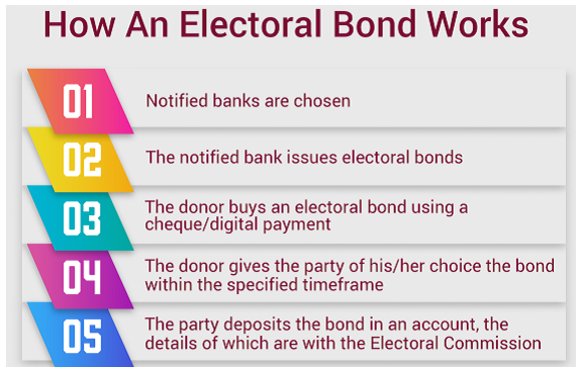
The Verdict Speaks: Unanimous Judgment Declares Unconstitutionality
In a unanimous judgment authored by Chief Justice D.Y. Chandrachud, the Supreme Court struck down the Electoral Bond Scheme. The judgment identified two key flaws:
- Violation of Right to Information: The court held that the anonymity provision restricts the public's right to know the sources of political funding, impacting informed voting and hindering the electoral process. It emphasized that transparency is not merely a desirable feature but a constitutional requirement.
- Lack of Scrutiny and Regulatory Oversight: The judgment pointed out the scheme's inadequate safeguards against money laundering and foreign interference. The opacity surrounding donations raised concerns about undue influence on political parties and potential subversion of democratic processes.
Implications Unfold: Charting a Path Forward
The Supreme Court's verdict has ushered in a significant shift in the landscape of political funding in India. Its potential implications are multifaceted:
- Enhanced Transparency: The verdict reinforces the need for transparent political funding, pushing towards a system where the sources and destinations of donations are known. This could pave the way for stricter reporting requirements and public disclosure of donations.
- Renewed Debate on Funding Reforms: The judgment reopens the debate on comprehensive electoral funding reforms. The Election Commission of India and the government are likely to revisit existing regulations and explore alternative models to ensure transparency and prevent undue influence.
- Challenges for Political Parties: Parties accustomed to the anonymity afforded by the Bond Scheme may face challenges adapting to increased transparency requirements. This could necessitate changes in fund-raising strategies and a greater focus on mobilizing small individual donations.
- Potential Legal Battles: While the Supreme Court's verdict is final, there may be attempts to challenge or reinterpret it. The government and other stakeholders could potentially seek clarifications or pursue alternate legal avenues.
Beyond the Verdict: Moving Towards a Transparent Democracy
The Supreme Court's decision on Electoral Bonds is a critical step towards achieving greater transparency and accountability in Indian democracy. However, the journey is far from over. Several key questions remain:
- What alternative models for political funding will be explored?
- How will parties adapt to the increased transparency requirements?
- What measures will be implemented to prevent potential misuse of alternative funding mechanisms?
- How will the Election Commission ensure effective enforcement of transparency regulations?
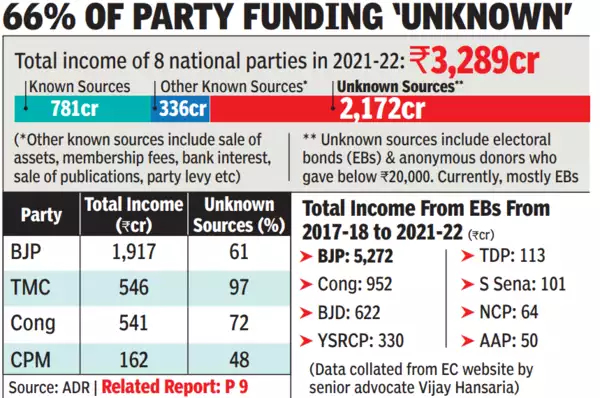
Addressing these questions and actively engaging in meaningful discussions are crucial to building a robust and transparent system of political funding that upholds the democratic values enshrined in the Indian Constitution. The Supreme Court's verdict may have closed one chapter, but it has opened a new one, filled with both challenges and opportunities to strengthen the very fabric of Indian democracy.
International Comparisons: Learning from Global Approaches to Political Funding
The Supreme Court's verdict on Electoral Bonds presents India with an opportunity to learn from diverse approaches to political funding adopted by other democracies. Examining international models can offer valuable insights and pave the way for effective reforms.
Public vs. Private Funding:
- Predominantly Public Funding: Countries like Austria, Germany, and Sweden primarily rely on public funding for political parties, often based on their share of votes in previous elections. This approach ensures transparency and minimizes undue influence from private donors.
- Mixed Model: Many democracies, like the United Kingdom and Canada, employ a mixed model, allowing both public and private funding within specified limits and disclosure requirements. This approach balances transparency with the freedom of individuals and organizations to participate in the political process.
- Predominantly Private Funding: The United States has a primarily private funding system with high contribution limits and complex disclosure rules. This system raises concerns about the influence of wealthy individuals and corporations on electoral outcomes.
Lessons for India:
- Transparency is Key: Regardless of the chosen model, ensuring transparency through mandatory and detailed disclosure of all donations is crucial.
- Balancing Interests: Striking a balance between ensuring fair competition and minimizing undue influence from powerful donors is essential.
- Learning from Experiences: Analyzing legal challenges faced by similar schemes, like Germany's 2013 ban on anonymous donations, can help India avoid pitfalls and establish robust regulations.
Similar Schemes and Legal Challenges:
- Germany's Party Donation Prohibition Act: In 2013, Germany banned anonymous donations above €50,000, aiming to increase transparency. However, legal challenges argued it restricts freedom of association and political participation. The Constitutional Court upheld the ban but emphasized proportionality and clear justifications.
- Brazil's Clean Election Laws: Introduced in 2015, these laws impose strict limits on private donations and provide public funding to parties based on their votes. However, concerns remain regarding corporate funding loopholes and the effectiveness of enforcement mechanisms.
These examples highlight the complexities involved in regulating political funding and the necessity of finding a model that suits India's specific context while prioritizing transparency and accountability.
The Verdict's Potential Impact: Untangling Foreign Investments, Corporate Participation, and Global Ripples
The Supreme Court's verdict on Electoral Bonds holds significant implications for foreign investments, corporate political participation, and even inspires comparisons within the global context. Let's delve into these potential ripple effects:
Foreign Investments:
- Increased Scrutiny: With the opacity of the Bond Scheme gone, foreign investors might face heightened scrutiny over their political donations in India. This could create apprehension and potentially discourage some investments.
- Enhanced Due Diligence: Investors might implement stricter due diligence procedures to ensure compliance with stricter transparency regulations and mitigate reputational risks.
- Focus on Non-Political Investments: Companies could shift their focus towards purely business-related investments to avoid any potential entanglement in political funding controversies.
Corporate Political Participation:
- Reduced Opaque Donations: Eliminating anonymous donations through Bonds might force corporations to adopt more transparent funding methods, reducing their influence through hidden channels.
- Focus on Direct Lobbying and CSR: Companies might increase their focus on direct lobbying and corporate social responsibility (CSR) activities to engage with the government and communities.
- Strategic Philanthropy: Corporations might channel their political involvement through carefully selected public and philanthropic initiatives rather than direct donations to parties.
Global Ripples:
- Scrutiny of Anonymous Funding Schemes: Countries considering similar anonymous funding schemes, like Malaysia, might re-evaluate their plans in light of India's experience. This could trigger a global trend towards increased transparency in political financing.
- Inspiration for Reform: The verdict could inspire other democracies to strengthen their own regulations and promote transparency in political funding.
- Potential Legal Challenges: Countries with similar schemes might face legal challenges similar to those in Germany, prompting debates about balancing transparency with individual rights.
It's important to note that:
- The actual impact on foreign investments and corporate political participation is yet to be fully understood and will depend on the specific regulatory framework established after the verdict.
- The ripple effects on other countries will depend on individual contexts and legal systems.
- The verdict could ultimately lead to a more level playing field and a healthier democratic process in India and potentially inspire similar reforms globally.
Reactions and Discourse: A Spectrum of Voices on the Electoral Bond Verdict
The Supreme Court's verdict on Electoral Bonds has ignited a spectrum of reactions and fueled a vibrant political discourse in India. Here's a glimpse into various stakeholder perspectives:
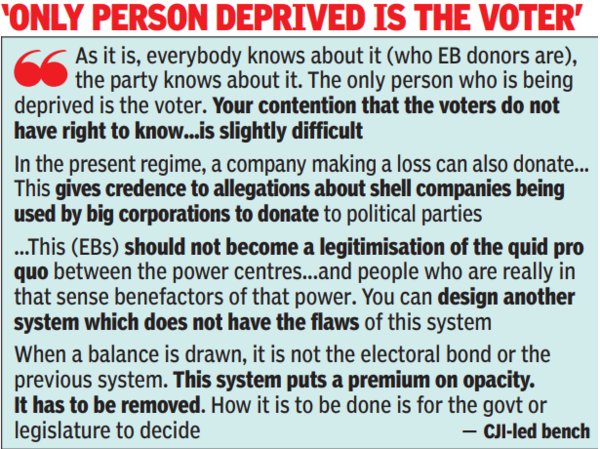
Political Parties:
- Ruling BJP: While maintaining a "respectful acceptance" of the verdict, the BJP expressed concerns about the potential impact on smaller parties struggling with resource mobilization. This stance highlights their potential anxieties about adapting to increased transparency requirements.
- Opposition Parties: Many opposition parties, including the Congress and TMC, hailed the verdict as a victory for transparency and accountability. They see it as an opportunity to level the playing field and curb the perceived advantage enjoyed by the BJP under the Bond Scheme.
Civil Society Organizations:
- Transparency International: Praising the verdict, they stated it "upholds the right to information and promotes clean elections." They emphasized the need for further reforms to address loopholes and promote greater transparency in political funding.
- Association for Democratic Reforms (ADR): This legal advocacy group, which led the challenge against the scheme, called the verdict a "landmark judgment" and urged the government to enact comprehensive electoral reforms.
Public Opinion:
- Opinion polls: A recent poll suggested over 60% of Indians support the verdict, favoring increased transparency in political funding. However, some expressed concerns about its potential impact on smaller parties and the need for alternative funding mechanisms.
- Social media: Online discourse reflected divergent views. While many celebrated the verdict's focus on transparency, others voiced concerns about its implications for smaller parties and potential misuse of alternative funding avenues.
Political Discourse and Reform Strategies:
- Calls for Comprehensive Reforms: Several stakeholders emphasize the need for broader electoral funding reforms beyond just transparency measures. This includes addressing issues like corporate donations, election expenditure limits, and state funding for parties.
- Debate on Public Funding: The possibility of introducing a system of public funding for political parties is being actively debated. While some see it as a means to reduce dependence on private donations, others raise concerns about its feasibility and potential misuse.
- Role of Election Commission: The Election Commission is expected to play a crucial role in formulating stricter regulations and ensuring their effective implementation. Its capacity and enforcement mechanisms will be under close scrutiny.
It's crucial to note that:
- The long-term implications of the verdict will depend on the specific reforms implemented and their effectiveness.
- Public discourse is likely to remain dynamic, with diverse viewpoints shaping the trajectory of future reforms.
- Finding a consensus on a robust and transparent political funding system that addresses multiple concerns will be a key challenge for policymakers.
Economic Ripples: Unveiling the Cost of Transparency
While the primary focus of the Electoral Bond verdict lies on its political and democratic repercussions, it also triggers significant economic considerations surrounding political parties, campaign financing, and the media landscape. Let's dissect these potential economic implications:
Political Parties:
- Increased Costs: Enhanced transparency regulations might necessitate investments in accounting and compliance infrastructure, adding to operational costs for political parties.
- Fundraising Strategies: Parties may need to shift their focus towards mobilizing smaller individual donations and engaging in alternative fundraising activities, potentially impacting their financial base.
- Potential Leveling Field: Increased transparency could make fundraising more predictable, potentially benefiting smaller parties by reducing reliance on opaque donations from powerful entities.
Campaign Financing:
- Reduced Opaque Spending: Stricter regulations could curb hidden campaign expenditures, potentially impacting industries involved in opaque advertising and marketing practices.
- Focus on Digital Campaigns: Increased scrutiny on traditional campaign expenses might drive parties towards cheaper digital avenues, impacting media companies reliant on political advertising revenue.
- Potential for Crowdfunding: Enhanced transparency could pave the way for more open and accountable crowdfunding platforms for political campaigns, offering new fundraising opportunities.
Media Industry and Investigative Journalism:
- Shifting Advertising Landscape: Reduced dependence on opaque political advertising could impact traditional media companies reliant on such revenue. They might need to diversify their business models and explore alternative income streams.
- Investigative Opportunities: Increased financial disclosures by parties could provide valuable data for investigative journalists, potentially leading to more in-depth reporting on campaign finances and potential irregularities.
- Challenges and Risks: Journalists might face challenges accessing funding for complex investigations and navigating potential legal complications arising from exposing financial wrongdoings.
Important Caveats:
- The precise economic impact is difficult to predict, depending on the specific regulations implemented and their enforcement mechanisms.
- Potential economic benefits, like reduced corruption and fairer competition, must be balanced against potential costs and challenges.
- Supporting investigative journalism and fostering a diverse media landscape are crucial for upholding transparency and accountability in a healthy democracy.
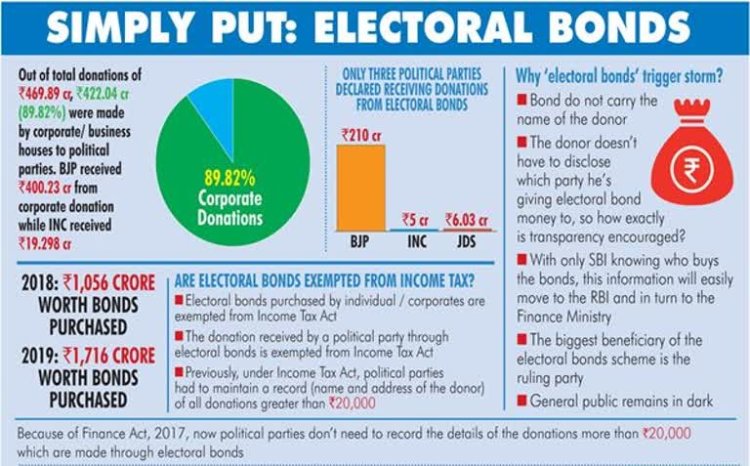
By carefully considering these economic implications and fostering a constructive dialogue, we can work towards implementing reforms that not only promote transparency but also ensure a sustainable and vibrant political ecosystem in India.
A Glimpse into the Future: Navigating the Labyrinth of Political Funding in India
Predicting the future of political funding in India is inherently complex, woven with numerous possibilities and challenges. However, based on current trends and ongoing discussions, here are some potential scenarios:
Scenario 1: Gradual Reform:
- The government and Election Commission implement incremental reforms, focusing on stricter disclosure requirements and limits on anonymous donations.
- This path offers a less disruptive transition but might face resistance from parties accustomed to the opacity of the past.
- The effectiveness of this approach hinges on robust enforcement mechanisms and addressing loopholes in regulations.
Scenario 2: Comprehensive Overhaul:
- A bolder approach involving a complete revamp of the political funding system, potentially incorporating public funding for parties.
- This scenario addresses transparency concerns decisively but requires consensus across political parties and a strong commitment to implementation.
- Challenges would include ensuring fair allocation of public funds, preventing misuse, and overcoming potential constitutional hurdles.
Scenario 3: Hybrid Model:
- A blend of public funding and stricter private donation regulations, tailored to India's context.
- This offers a balanced approach addressing concerns while mitigating financial burdens on smaller parties.
- Careful design and safeguards are crucial to prevent misuse of public funds and ensure compliance with private donation regulations.
Potential Challenges and Opportunities:
- Political Will and Consensus: Implementing any reform requires political will and consensus across major parties, which can be a tall order.
- Enforcement Mechanisms: Building robust enforcement capacity for the Election Commission and other oversight bodies will be critical.
- Public Scrutiny and Engagement: Sustained public interest and participation in monitoring political finances are essential.
- Technological Innovations: Leveraging technology for secure and transparent reporting and fundraising platforms can offer opportunities.
Opportunities for the Future:
- Strengthening Democracy: Enhanced transparency can foster greater public trust in political institutions and empower informed voting.
- Reducing Corruption: Addressing opaque funding sources can create a level playing field and reduce the scope for corruption.
- Empowering Small Parties: Reforms may facilitate greater participation of smaller parties by reducing dependence on large donors.
- Evolving Landscape: Keeping pace with evolving technologies and adapting regulations to ensure their effectiveness will be crucial.
Ultimately, the future of political funding in India hinges on the collective resolve of policymakers, civil society, and the public to prioritize transparency, accountability, and a level playing field. By embracing constructive dialogue, navigating challenges, and seizing opportunities, India can move towards a more transparent and ethical political funding system, safeguarding the core values of its democracy.
Transparency and Accountability: The Cornerstones of a Healthy Democracy
The Supreme Court's verdict on Electoral Bonds stands as a testament to the fundamental importance of transparency and accountability in a healthy democracy. Opaque funding mechanisms erode public trust, hinder informed voting, and create fertile ground for undue influence and potential corruption.
Transparency ensures that citizens can access information about how their political representatives are financed, allowing them to make informed decisions and hold them accountable. It empowers individuals to engage with the political process with increased confidence and knowledge. Accountability, in turn, ensures that political parties operate within established rules and ethical boundaries, safeguarding the integrity of electoral processes and upholding democratic values.
The ongoing discourse surrounding political funding in India presents a crucial opportunity to shape a future where transparency and accountability reign supreme. We must leverage this moment to advocate for meaningful reforms that go beyond merely patching the flaws of past systems.
This is a call to action for all:
- Engage in dialogue: Participate in discussions about potential reforms, share your views with representatives, and demand open and inclusive consultations.
- Seek information: Educate yourself about the current issues and potential solutions for a more transparent and accountable political funding system.
- Support civil society organizations: Organizations dedicated to transparency and electoral reforms require our collective support to effectively advocate for positive change.
- Hold your representatives accountable: Demand clear responses and justifications from your elected officials regarding their positions on reform proposals.
Remember, democracy thrives on the active participation of its citizens. By joining the conversation, demanding action, and actively engaging in shaping the future of political funding, we can collectively pave the way for a more transparent, accountable, and ultimately, stronger democracy in India.
Let the Supreme Court's verdict not be an end, but a powerful springboard for meaningful change. Together, let us build a political system where transparency and accountability shine brightly, illuminating the path towards a more just and equitable society.
Further Reading and Research: Exploring the Depths of Political Funding in India
To delve deeper into the intricate world of political funding in India and its future trajectory, here are some valuable resources:
Academic Articles:
- "Transparency and Accountability in Political Funding: A Comparative Analysis of India and the United States" by Smita Mishra (Journal of South Asian Studies, 2015)
- "The Impact of Electoral Bonds on Political Party Funding in India" by Milan Vaishnav (India Studies Quarterly, 2019)
- "Funding Elections in India: An Analysis of Challenges and Reforms" by Trilochan Sanyal (Economic and Political Weekly, 2023)
Legal Documents:
- Supreme Court of India judgment on Electoral Bond Scheme (February 15, 2024)
- Election Commission of India website and reports on political funding
- Law Ministry of India website and legislation related to electoral funding
Additional Resources:
- Association for Democratic Reforms (ADR): https://adrindia.org/
- Transparency International India: https://www.transparency.org/en/countries/india
- Centre for Policy Research (CPR): https://cprindia.org/
What's Your Reaction?


















